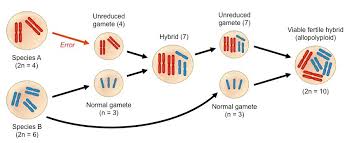Triploids (3x) are the first category of plants among the polyploids. Triploids have chromosome complement 3x implying that chromosome complement is at ploidy level of 3. They are the first category of organisms that are polyploids. Recall that organisms with ploidy levels greater than two are polyploids. Therefore, polyploids start from triploids.
Autopolyploids and Allopolyploids
In the real of polyploids, we must distinguish between autopolyploids and allopolyploids. Autopolyploids are composed of multiple sets from within oen species. Allopolyploids are composed of sets from different species.
An important implication of the above is that allopolyploids arise through hybridization. Hybridization is the formation of a progeny called hybrid from mating between genetically unrelated parents.
Important: Triploids are usually auto triploids
When we consider allopolyploidy, the degree of unrelatedness matters. Genome allopolyploids contain clearly different basic genomes derived frok different species. The genome formula is represented as AAB.
Segmental allopolyploids contain genomes that are not strikingly dissimilar because the combining species are slightly related. The genome formula is represented as AAA1.
Production of Triploids
1. Genetic Non-Reduction
This is occurs when a normal gamete is fertilized by an unreduced pollen.


Fertility in Triploids
Meiosis inTriploids
Triploids contain odd number of chromosome set or ploidy (i.e. 3x). Thus each chromosome occurs in triplicate.
Read Also : How to Plant Fruit Trees for Optimum Performance
The three homologous chromosomes experience pairing problems: normal bivalents characteristic of normal meiosis does not occur.
Thus univalent-bivalent and trivalent pairing can occur. Possible trivalent configurations formed in triploids are shown in the figure below:

Principle of Partner Exchange
Note that in the trivalents, meiotic pairing in any region is united to only two homologues at a time.
Regions where the chromosomes change their pairing association from one pairing partner to another is called partner exchange.
Gamete Production
Since chromosomes occur in triplicates in triploids, there is no way to ensure that the resulting gametes obtain a complete (or balanced) chromosome complements of x or 2x. Unbalanced gametes are produced and triploids have no seeds. Thus they are sterile. Examples are banana and triploid watermelon.
The only way to ensure fertility in triploids is when all the single chromosomes pass to the same pole and simultaneously the other two chromosomes pass to the opposite pole, then the gametes formed will be balanced having haploid (x and diploid (2x) chromosome complements respectively. The probability of this type of meiosis will be (1/2)x-1.
Occurrence of Polyploidy in Plants as Compared to Animals
Polyploids (and monoploids) are much more common in plants than in animals. 30-35% of the angiosperms are polyploids. In Gramineae (grass family) it occurs with a frequency of 75%.
Reasons why Polyploidy is less common in Animals than in Plants
1. Disturbance of Sex Determination Mechanism
The XY sex determination mechanisms is upset in animals when chromosome sets are duplicated.
2. Histological Barrier
Animals are complex and polyploidy interferes with developmental pattern during tissue differentiation. For instance occurrence of plyploidy in man leads to spontaneous abortion.
3. Cross Fertilization Barrier
Interspectific cross fertilization is rare in animals but common in plants. Moreover, hybrids are developmentally defective.
4. Hybrid Sterility
Even if viable hybrids are formed they are unable to reproduce sexually, and cannot last long for the rare occurrence of chromosome doubling which gives fertile allotetraploids.
Note: Polyploid cells occur in particular organs in some mammals. E.g. some liver cells are polyploids.
Advantages of Polyploidy
Increased chromosome number leads to larger nucleus. The amount of cytoplasm therefore increases to preserve the nucleus: cytoplasm ratio. This leads to increase in size of plant and its parts.
Polyploidy allow for greater genetic diversity than in its diploid progenitors since more than two alleles will be present at a locus while the diploid will have only 2 alleles per locus.
Greater enzyme multiplicity and activity resulting from gene diversion may allow the polyploidy to be more physiologically and ecologically more successful than the diploid cou9nterparts.
Buffer Effect: In polyploids, extra chromosomes function as genetic buffers. Therefore, aneuploidy usually go unnoticed. For instance, a nullisomic diploid often does not survive; however, a nullisomic polyploidy may survive but exhibit reduced vigour and reduced fertility. The buffer effect is caused by chromosome compensation.
In summary, although triploids have improved qualities over their diploid counterparts, they are, however, sterile in view of their meiotic irregularities.
Triploids are the first group of polyploids. They have 3x chromosome complement. Although triploids have improved qualities when compared to diploids, they are sterile because unbalanced gametes and seedlessness result from meiotic irregularities of triploids.
Read Also : The Four (4) Traditional Waste Management Methods

